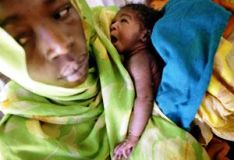Babies conceived of rapes by janjaweed face daunting futures
By Sudarsan Raghavan, Knight Ridder Newspapers
ABU SHOUK, Sudan, Nov 26, 2004 (KRT) — There were no smiles, no blessings at the birth of the light-skinned girl with the ebony eyes and curly black hair. Not a glimpse of joy. For a family still bleeding from war, the baby was like salt on their wounds.

|
|
Suad Abdalaziz, 28, who was raped and became pregnant during a attack by the Jajaweed in the village of Tawila, holds her 3-day-old baby girl. (KRT). |
“My father didn’t speak for the entire day,” recalled her mother, Suad Abdalaziz, 28, her voice cracking and her face streaming with tears. “He was not angry at me. He was angry at the janjaweed and the government for giving me this baby.”
In the troubled province of Darfur, pro-government Arab militias called the janjaweed have raped countless black African women in a campaign that the Bush administration has called genocide.
Now, their babies are emerging across this tableau of human suffering. They are outcasts in a war-scarred society where rape is a source of shame and a father’s identity defines the child.
Relatives shun them, seeing in their tiny faces the atrocities committed by their enemies. Mothers struggle to accept them, torn between loyalty to their tribe and their instincts to love and care. Many are resigned to a life of isolation, where marriage is unlikely and where their children will forever carry a stigma.
“These are the babies of the janjaweed,” said Hassan Abdallah Bakhur, a tribal elder from the town of Tawilla, 40 miles south of here. “I don’t know how we can solve this problem. They and their mothers face a bad future.”
Seated in her cool tent, her feet nervously shifting in the sand, Suad cradled the infant she had borne three days earlier. She was still thinking of a name worthy of the child. She wiped her puffy, almond-shaped eyes and continued. “I didn’t show her to the people,” she said. “I was ashamed.”
Suad’s ordeal began in February, when the janjaweed raided Tawilla, burning huts, pillaging livestock, and raping hundreds of black African women, most of them members of the Zaghawa tribe. Three militiamen on horseback chased her down as she ran through the scabby terrain and dragged her into a hut. They ripped off her top and tore it apart, stuffing one piece in her mouth and wrapping the other over her eyes.
Then, the lighter-skinned Arabs spat out the words that haunt her today: “We want to change the color of your children.”
Suad’s story is hardly unique. Many of the raped women of Tawilla filtered to the refugee camp of Abu Shouk, where it’s not easy to keep something like rape a secret.
When Medina Muhammed, 18, saw her body changing, she told her father about that chaotic day in Tawilla when five Arab militiamen raped her.
“This child of the janjaweed, I don’t want to see it,” Medina recalled him saying. “I’ll remember these people. I can’t accept this child.”
Then he left six months ago to join his two wives and their children. Medina hasn’t seen him since.
Nor did any of her relatives visit her in the hospital when the baby arrived several weeks early and she fell ill. And when the traditional naming ceremony was to be held seven days after birth, no one came to celebrate a fatherless baby born of hate.
Medina named her child alone: Menazel. In the Quran, Islam’s holy book, the word “Houses of the Stars.” Medina picked it “because the janjaweed burned our houses.”
For a surname – usually the name of the father – she selected Juma. It means Friday, the day Medina was raped.
Medina’s mother, Mariam Adam, insisted the child would be treated like any other. But she acknowledged she hasn’t learned the child’s name: “I forgot to ask,” she explained.
She’s more concerned about whether her daughter will find a husband.
“It will be difficult to marry off Medina,” said Adam. “Only an old man may be willing to marry her because she has a child from the janjaweed.”
And if she doesn’t marry? “She may become a prostitute,” Adam said.
Muhammed Adam, Medina’s silver-haired uncle, expressed an even greater fear: “Or she may commit suicide. She feels all the people around her dislike her.”
As for the children borne of janjaweed rape, Muhammed has other fears: “These children could become janjaweed later and attack us again.”
Still, Menazel’s life seems much better than tiny Ismail’s.
Ismail’s mother, Salima Muhammed, 18, hasn’t visited him in two weeks in the clinic where he now lives. Ismail survives because Bakhur, the tribal elder, has ordered other women to breastfeed him.
“I don’t dislike my baby,” said Salima, round-faced with a smile that appears tattooed to her face. “I want him back”
But aid workers and tribal elders paint a different picture. They say Salima is mad. She watched the janjaweed kill her husband. Then they gang-raped her. Now, Ismail torments her. She has hit him and tried to drown him. So Bakhur ordered that Ismail be taken from her.
“She refused the child because he was from the janjaweed,” said Zainab Hassan, 42, a woman assigned to breastfeed Ismail.
Three days after giving birth, Suad acknowledges that her janjaweed baby has upended her life. Her career as a teacher is over “because all the people will hear this child is fatherless and will talk.” Her prospects for marriage are slim “because I have lost my honor.” She feels bitter, alone, and suffers from a foreboding she has never felt before. “This baby destroyed my future,” she said.
Yet Suad is also a mother. “This is my baby, and the baby doesn’t know anything that happened. So I must love her,” she said.
And then she names the infant: Ihsan.
It means Goodness and Perfection.
